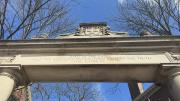Yale University announced today that its endowment assets had earned an investment return of 8.9 percent in fiscal year 2010, ending last June 30. That trails the 11 percent reported by Harvard Management Company, and Columbia's 17 percent, both announced earlier in the month. In fiscal 2009, when Harvard's rate of return was negative 27.3 percent, Yale's was negative 24.6 percent.
Also today, Dartmouth reported a 10 percent investment return for fiscal 2010.
According to Yale's release, the university's endowment grew a modest 2.5 percent, from $16.3 billion to $16.7 billion, reflecting investment gains of $1.4 billion, distributions for operating expenses of $1.1 billion, gifts of $136 million, and adjustments of negative $70 million (changes in the value of pledges, etc.). During the year, Harvard's endowment grew 5.4 percent, to $27.4 billion, reflecting investment gains, gifts, and distributions for operating and other expenses of approximately $1.56 billion. In the current fiscal year, Yale's announcement said, spending from its endowment will decline to $986 million: about 38 percent of Yale's revenues, down from a peak two years ago of 45 percent. (Endowment distributions account for about 35 percent of Harvard's revenues.)
Yale's release cited the poor performance of real assets (real estate, oil and gas, and timber), some 28 percent of its holdings; for the year, such investments yielded a negative 4.5 percent return. Harvard Management Company also reported a loss on such investments. In most respects, performance was comparable among the two universities' portfolios. Compared to Harvard, Yale maintains an endowment portfolio more heavily weighted toward real assets and private equity, and therefore less invested in stocks and bonds (both of which performed well during fiscal 2010).
Yale's 10-year annualized rate of return is 8.9 percent; Harvard's is 7.0 percent.
Results from other institutions with similar investment strategies, including Princeton and Stanford, are expected to be reported in the near future.








